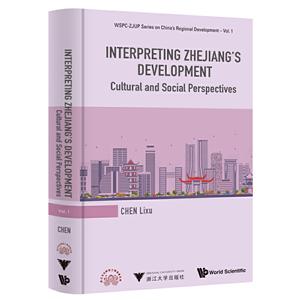扫一扫
关注中图网
官方微博
本类五星书更多>
-
>
心理学经典文丛:女性心理学
-
>
贫困一代:被社会囚禁的年轻人
-
>
乌合之众:大众心理研究(英汉双语修订版)(套装共2册)
-
>
始于极限:女性主义往复书简
-
>
融合文化(新媒体和旧媒体的冲突地带)/文化和传播译丛
-
>
看不见的女性
-
>
县乡中国:县域治理现代化
从传统到现代:浙江现象的文化社会学阐释(英文版) 版权信息
- ISBN:9787308186865
- 条形码:9787308186865 ; 978-7-308-18686-5
- 装帧:精装
- 册数:暂无
- 重量:暂无
- 所属分类:>>
从传统到现代:浙江现象的文化社会学阐释(英文版) 内容简介
改革开放以来,浙江由小商品、手工艺活动开始,积跬步而千里,从不太发达的区域迅速成长为经济社会发展靠前于全国的省份。浙江如何开发自己独特的区域发展战略,进而形成所谓的“浙江模式”? 许多学者试图从经济和政治政策角度来解释,但其背后的文化和精神因素却缺乏足够的研究。本书从文化社会学角度,来理解和解释浙江从传统向现代社会转型,呈示所谓“诱致性”变迁的特点,就当代浙江区域文化发展与社会发展的互动问题进行探索。本书自2007年初版以来,引起了学界广泛关注,社会各界对于“浙江模式”文化社会学视角的探讨持续不断,比如家庭工厂的兴起和繁荣的家族企业、区域集群,以及遍布全国甚至全世界的“浙江城镇”等。当前,随着“一带一路”倡议的提出,“浙江模式”的内涵更具丰富,也更具现代性。本书计划在初版的基础上进行修订,试图在当前语境下剖析“浙江模式”的文化社会学因素。
从传统到现代:浙江现象的文化社会学阐释(英文版) 目录
Introduction
Chapter 1 Regional Culture and Spiritual Engine for
the Economic and Social Development of
Zhejiang Province
1.1 The Origin of the Problem
1.2 Characteristics of the Regional Development Pattern
of Contemporary Zhejiang
1.2.1 Government-Improved Model of Regional
Institution Innovation and Economic and Social
Development
1.2.2 The People-Induced Model of Regional Institution
Innovation and Economic and Social
Development
1.3 The Marginal Area of the Planned Economy and People-
Induced Spiritual Motivation
1.3.1 A Question that Needs Clarification
1.3.2 The Marginal Area of the Planned Economy and
the Self-Entrepreneurial Spirit
1.4 Large Population with Limited Land and the People-
Induced Spiritual Motivation
1.4.1 Influence of the Natural Environment on the
Spirit
1.4.2 The Contradiction between People and Land and
the Spirit of Self-Entrepreneurship
Chapter 2 The Cultural Tradition of"Striving for Practical
Results" and the Zhejiang's Economic and Social
Development
2.1 The Spirit of"Striving for Practical Results" and
the Contemporary Phenomena of Zhejiang Economic
Society
2.1.1 The Spirit of"Striving for Practical Results" under
the Planned Economy
2.1.2 The Spirit of"Striving for Practical Results" Since
the Reform and Opening-up
2.2 Regional Great Tradition and the Cultural Spirit of
"Striving for Practical Results" .
2.2.1 A Dilemma That is Hard to Justify
2.2.2 The Confucian Cultural Tradition and the Spirit of
"Striving for Practical Results" .
2.3 Regional Folk Tradition and the Cultural Spirit of
"Striving for Practical Results" .
2.3.1 Practice of the Folk Industry and Commerce and
the Spirit of"Striving for Practical Results" .
2.3.2 The Folk Social Psychology and the Spirit of
"Striving for Practical Results" .
Chapter 3 The Cultural Tradition of Industry and
Commerce and the Economic and Social
Development of Contemporary Zhejiang
3.1 Great Cultural Tradition of Industry and Commerce
of Ideologists
3.1.1 Industry and Commerce Being Equally Important
3.1.2 Four Social Classes Engaging in Different Work
Share the Same Purpose of Being Conscientious
3.2 Little Traditions of Folk Industrial and Commercial
Culture
3.2.1 Little Folk Cultural Traditions as Life Policy
3.2.2 Little Cultural Industrial Traditions of Zhejiang
Folks
3.2.3 Little Cultural Traditions of Commerce of Zhejiang
Folks
3.3 Cultural Tradition of Industry and Commerce and
Path of Zhejiang's Economic and Social Development
3.3.1 Regional Cultural Tradition of Industry and
Commerce and Contemporary Zhejiang Economic
Evolution
3.3.2 Regional Cultural Tradition of Industry and
Commerce and the Development of Contemporary
Zhejiang Society
3.4 Differences in Traditional Business and Contemporary
Relations with Economic and Social Development
in Zhejiang, Huizhou and Shanxi
3.4.1 Comparison of Traditional Commercial Culture
in Zhejiang, Shanxi and Huizhou
3.4.2 Cultural Traditions of Businessmen in Zhejiang,
Shanxi and Huizhou, and the Contemporary
Political Environment
3.4.3 Features and Subsequent Effects of Zhejiang,
Huizhou and Shanxi Merchants' Cultural
Traditions
3.4.4 The Evolution and Expansion of the Cultural
Tradition of Zhejiang Merchants in the
Contemporary Era
Chapter 4 Trust, Social Network and Zhejiang's Economic
and Social Development
4.1 Particularistic Trust and Family Culture in the Region
of Zhejiang
4.1.1 Family Culture, Particularistic Trust and
Differential Mode of Association
4.1.2 Family Culture and Particularistic Trust Pattern
in the Region of Zhejiang and Their Revival
4.2 Trust Pattern, Network of Relationships and
Economic and Social Behaviors in Contemporary
Zhejiang
4.2.1 Particularistic Trust, Network of Relationships
and Performance of Regional Responsibility
System in Agriculture
4.2.2 Particularistic Trust, Network of Relationships
and Regional Social and Economic Activities
4.3 Particularistic Trust, Network of Relationships and
Zhejiang's Business Organizations
4.3.1 Particularistic Trust, Network of Relationships and
Village and Township Collective Enterprises
4.3.2 Particularistic Trust, Network of Relationships and
Private Enterprise Organizations
4.3.3 Particularistic Trust, Network of Relationships and
State-Owned Enterprise Organization
4.3.4 Particularistic Trust, Network of Relationships
and Organizational Performance of Enterprises
Bibliography
展开全部
书友推荐
- >
姑妈的宝刀
姑妈的宝刀
¥11.4¥30.0 - >
经典常谈
经典常谈
¥22.7¥39.8 - >
大红狗在马戏团-大红狗克里弗-助人
大红狗在马戏团-大红狗克里弗-助人
¥3.9¥10.0 - >
回忆爱玛侬
回忆爱玛侬
¥12.5¥32.8 - >
人文阅读与收藏·良友文学丛书:一天的工作
人文阅读与收藏·良友文学丛书:一天的工作
¥16.0¥45.8 - >
罗庸西南联大授课录
罗庸西南联大授课录
¥18.6¥32.0 - >
朝闻道
朝闻道
¥9.0¥23.8 - >
唐代进士录
唐代进士录
¥18.7¥39.8
本类畅销
-
孤独的城市
¥37.4¥55 -
中国乡村研究-第十三辑
¥15.7¥49 -
疾病与文化——医学人类学译丛生死有时:美国医院如何形塑死亡
¥52.8¥88 -
乡土中国生育制度
¥29.6¥58 -
社会网分析讲义
¥44.2¥69 -
新周刊.2019年度佳作.脚下有路,心中有光
¥28.1¥55















